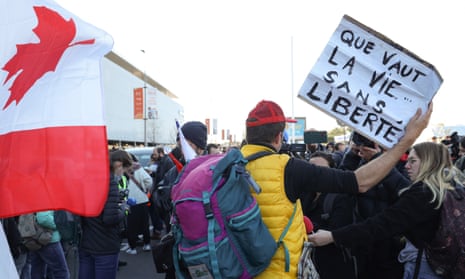“Freedom convoys” of motorists that have set off from half a dozen French cities in protest against the country’s coronavirus restrictions will not be allowed to enter Paris, the capital’s police authority has said.
“The stated objective of these demonstrations is to ‘block the capital’ by preventing road traffic from circulating in order to further their demands … from Friday, before moving on to Brussels on Monday,” the authority said.
“Because of the risk to public order, these protests will be banned from 11 to 14 February,” it said, adding the penalties for blocking public roads included two years in prison, a fine of €4,500 and a three-year driving ban.
Convoys of cars, vans and motorbikes left Nice in the south-east, Bayonne in the south-west, Strasbourg in the north-east and Cherbourg in the north-west, among other cities, for Paris on Wednesday and Thursday, inspired by a two-week truckers’ demonstration in Canada.
Canadian drivers protesting against testing and vaccine rules have blockaded the busiest bridge on the country’s border with the US and paralysed the capital, Ottawa. Similar protests have taken place in Australia and New Zealand.
“There will be a special deployment of officers to prevent blockages of major roads, issue tickets and arrest those who contravene this protest ban,” Paris police said, adding that instructions had been given to “act firmly”.
Belgian authorities said they too would ban any convoys from converging on Brussels next week, after a call to protest circulated on social media. “Means are being put in place to prevent the blocking of the Brussels-Capital Region,” said the mayor of the Belgian capital, Philippe Close. Close said federal police would carry out special border controls to stop convoys from entering the country.
The French protesters are mainly angry about the government’s vaccine pass, which proves people have been fully vaccinated and is required to go to cafes, restaurants, cinemas, museums and sports events as well as to take long-distance trains.
“We are just tired of it all. We want to go where we want without being asked for a vaccine pass. At least with this action, I am doing something,” an independent truck driver, who joined the protest in the city of Perpignan, told Reuters news agency.
The movement, organised on social media through Facebook and Telegram groups each with about 25,000 members, also includes anti-vaxxers and some figures from the anti-government gilets jaunes (yellow vests) protests of 2018 and 2019.
The government’s spokesperson, Gabriel Attal, said he recognised the public’s “weariness” with Covid control measures but France was among the European countries that had “the fewest restrictions infringing on citizens’ freedom”.
Marine Le Pen of the far-right National Rally party said she “understood” the protesters’ goals, saying that it was “another form” of the gilets jaunes demonstrations. An MP from Emmanuel Macron’s party, La République En Marche, said the government was listening but the protesters’ demands were “not very clear”.
